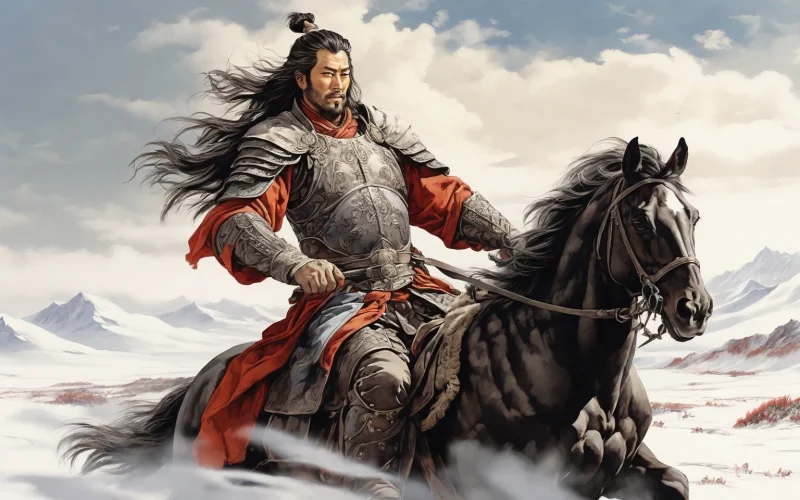Beyond the Black Mountains, rain and snow descend in gloom,
Travelers point toward Lulong Pass, lost in the wintry plume.
Ten thousand miles of flying sand choke war-drums' muffled roar,
The banners of three armies stiff with killing breath of war.
You, like Chen Lin, wield the pen—so light, so keen, so grand—
Yet marshal troops and seize strongholds with a strategist’s hand.
Our sovereign loves both sword and scroll, rewards both brave and wise;
May your title outshine all that Han's great lords could realize.
Original Poem
「卢龙塞行送韦掌记」
钱起
雨雪纷纷黑山外,行人共指卢龙塞。
万里飞沙咽鼓鼙,三军杀气凝旌旆。
陈琳书记本翩翩,料敌张兵夺酒泉。
圣主好文兼好武,封侯莫比汉皇年。
Interpretation
This poem was composed during the mid-Tang Dynasty by Qian Qi as a farewell piece for his friend Wei Zhangji, who was departing to assume a post at the frontier. Lulong Pass, a critical military stronghold located in present-day northern Hebei Province, served as a vital gateway between Youzhou and the northeastern territories. The poem intertwines parting emotions with majestic frontier imagery and the spirit of national campaigns, while conveying blessings for the friend's future and praise for the enlightened ruler. Blending the vigor of frontier poetry with the tenderness of farewell verse, the work exhibits both grandeur and literary brilliance.
First Couplet: "雨雪纷纷黑山外,行人共指卢龙塞。"
Yǔ xuě fēn fēn hēi shān wài, xíng rén gòng zhǐ Lúlóng sāi.
Beyond Black Mountain, sleet and snow swirl ceaselessly;
Wayfarers point as one toward Lulong Pass ahead.
The opening lines unfold with vast natural imagery, depicting the harshness of frontier life. The "sleet and snow beyond Black Mountain" accentuate the perilous journey, while travelers gesturing toward the distant pass evoke a sense of daunting prospects and implicit concern for the friend's mission.
Second Couplet: "万里飞沙咽鼓鼙,三军杀气凝旌旆。"
Wàn lǐ fēi shā yè gǔ pí, sān jūn shā qì níng jīng pèi.
For ten thousand miles, flying sand muffles war drums;
Three armies' battle-aura congeals on banners.
Transitioning to the battlefield, this couplet portrays the frontline's intensity: drumbeats drowned by swirling dust, flags stiff with martial resolve. The description heightens the poem's solemn tone while underscoring the weighty responsibilities awaiting the friend.
Third Couplet: "陈琳书记本翩翩,料敌张兵夺酒泉。"
Chén Lín shū jì běn piān piān, liào dí zhāng bīng duó Jiǔquán.
Like Chen Lin of old, your grace shines through documents;
Now you'll strategize to seize Jiujuan's fortress.
The poet compares Wei to Chen Lin, the illustrious Eastern Han scholar, highlighting his literary elegance while anticipating his tactical triumphs. "Seizing Jiujuan" symbolizes not just territorial gain but heroic ambition, embodying profound expectations.
Fourth Couplet: "圣主好文兼好武,封侯莫比汉皇年。"
Shèng zhǔ hào wén jiān hào wǔ, fēng hóu mò bǐ Hàn huáng nián.
Our sage lord values letters and arms alike—
Your coming peerage will outshine Han dynastic honors.
The finale elevates personal aspirations to national ideals. By extolling the Tang emperor's dual appreciation of civil and military arts, the poet amplifies the poem's righteous tone while inspiring his friend toward glory. The resounding close leaves an enduring echo of imperial praise and promise.
Holistic Appreciation
This poem exemplifies the frontier farewell genre, where the poet uses the harsh snowstorms of the borderlands to evoke the arduous conditions beyond Lulong Pass and the intense atmosphere of warfare. While praising his friend's literary talent, the poet also expresses expectations for his military achievements. Blending personal sentiment with national duty, the poem carries profound historical weight and contemporary relevance. The latter couplets intertwine scholarly refinement with martial ambition, balancing cultural elegance and masculine vigor, making the work both erudite and aspirational.
Artistic Merits
- Scenic Opening, Vast Setting: Images like "driving snow" and "beyond Black Mountain" establish a desolate backdrop, emphasizing the harsh environment and emotional gravity.
- Fusion of Scene and Sentiment: War imagery—whirling sand, battle drums, and banners—doubles as emotional texture, merging action with feeling.
- Allusive Depth, Historical Resonance: The reference to "Secretary Chen Lin" invokes ancient figures, praising the friend's talent while projecting contemporary aspirations with subtlety.
- Elevated Conclusion: The final line broadens perspective to imperial glory, ending the poem on a heroic, uplifting note.
Insights
This poem reminds us that poetry can be more than emotional expression—it can also carry ideals and ambitions. Qian Qi avoids sorrowful clichés, instead channeling the frontier's grandeur to depict a scholar-warrior's dedication to the nation. By linking典故 to reality, he empowers his friend with spiritual fortitude. The poem embodies the Tang literati's dual commitment to culture and duty, a luminous ethos that still resonates today.
About the Poet
Qian Qi (钱起, c. 722-780), a native of Huzhou, Zhejiang, was the foremost of the "Ten Talents of the Dali Era" in mid-Tang poetry. His poetic style, inheriting Wang Wei's legacy, excelled particularly in regulated verse (五律), characterized by its ethereal elegance. Yan Yu praised his work as "innovative in form," reflecting the Dali period's transition from the High Tang's naturalism to refined craftsmanship.











